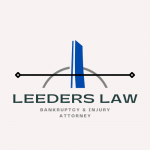WHAT ARE THE MOST COMMON REASONS FOR FILING A CHAPTER 7 BANKRUPTCY?
The most common reasons for consumer bankruptcy are: unemployment, high medical expenses, over-extended credit, marital problems and other large unexpected expenses.

LEEDERS LAW
The most common reasons for consumer bankruptcy are: unemployment, high medical expenses, over-extended credit, marital problems and other large unexpected expenses.
You can keep your house and your car as long as there is no equity in the house or vehicle and you are current on your loan payments, if any. In most cases you are able to keep all of your personal belongings. Illinois law allows you exemptions to protect most property from creditors. Consult an attorney at Leeders Law to discuss how the Illinois bankruptcy exemptions can protect your belongings in Chapter 7.
Generally you cannot keep your credit cards when you file for bankruptcy. Why would you want to stay in debt after bankruptcy? However, some creditors will let you keep your credit cards or financed items if you reaffirm the debt and make payments to that creditor after your bankruptcy is discharged. The court must review and approve a reaffirmation agreement to make sure it is affordable for you and won’t likely put you back in the hole after filing for bankruptcy. In most cases, the bankruptcy judge will not let you reaffirm a credit card because the terms are usually horrible and there are usually plenty of credit offers shortly after bankruptcy. The most popular reaffirmations are for car loans and for home mortgages. Reaffirmation agreements are only filed in chapter 7 bankruptcy cases. There are no reaffirmations in a chapter 13 case.
There is no statutory amount of debt that is needed to file a bankruptcy. I talk to my clients and review their budgets to see if they can afford to pay back their debts over time. It really depends on your specific situation. For example, $10,000 in credit card debt for someone who makes $100,000 a year is much different than $10,000 in medical bills for someone who only draws $600 a month in social security benefits. I can help you review all options you have to help you decide what is the best choice for you.
There are several debts that are not dischargeable in a chapter 7 bankruptcy filing. Debts such as student loans, parking tickets, government debts, child support, recent taxes and fraudulent debts will not be discharged in bankruptcy. Some exceptions do apply. Consult with a Leeders Law attorney to find out your legal rights.
The most common reasons to file a Chapter 13 bankruptcy are to stop a pending foreclosure, to save your car from being repossessed, for debt consolidation,to repay student loans, tax debt, back due child support, and other non-dischargeable debts and for those who have filed a Chapter 7 Bankruptcy in the last 6 years.
Chapter 7 is designed to eliminate unsecured debts. It discharges consumer debts such as credit cards, medical bills, and personal loans. Some debts, like parking tickets, child support, most student loans, and certain tax debt are not discharged in a chapter 7 bankruptcy case.
Chapter 13 is designed to repay your creditors and keep your assets such as your car or home based on your ability to repay your debts. It can help you eliminate your consumer debts, including tickets. It is often used to stop foreclosure on a home, stop a vehicle repossession, or get a client off of the vehicle boot list from parking tickets and other moving violations. Debtors need steady income to fund a chapter 13 repayment plan. Cases last usually from 3 to 5 years. My clients can pay back their unsecured debts as little as 10% owed, based on their income and assets.
A Chicago bankruptcy attorney from Leeders Law can help you choose which chapter is best for you.
After your bankruptcy is discharged you will be able to get credit again. Often you are able to finance a vehicle as soon as your bankruptcy case is discharged. You are able to apply for and get credit cards and personal loans once you receive your discharge. Qualified applicants are able to buy homes within 1-2 years of receiving their bankruptcy discharge.
Bankruptcy helps eliminate all of the bad debt reported on your credit report, and can help increase your credit score after bankruptcy. When we pull a credit report for you from the credit bureaus, it will give you your current credit score, and it will predict where you should be within a year after your bankruptcy case. Most of my clients see a prediction where their credit score increases 50 to 100 points within the first year after bankruptcy.
A Bankruptcy will remain on your credit report for 10 years after your bankruptcy case is discharged. However, you may be able to get credit during that time.